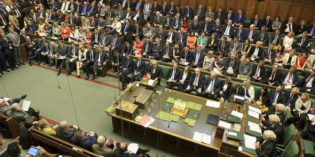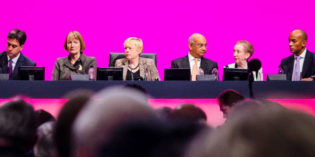
The optics of a cabinet reshuffle: PR vs reality
Increasing the number of women in Cabinet is widely perceived as a positive move, and Theresa May’s January reshuffle was presented as a bold step to make the government more diverse, writes Jessica Smith (Birkbeck). However, it failed to fulfil its own promises, and so missed an opportunity to create significant change in levels of representation at the top.

Majoritarianism reinterpreted: why Parliament is more influential than often thought
Though Westminster is often seen as lacking the teeth to affect government policy, this is not the case, writes Felicity Matthews. She argues that reforms to shift the balance between government and parliament have served to offset the declining vote basis of government, and have ensured that Westminster remains responsive to a majority of the electorate through the legislative process.

We don’t know how democracies die
Since the election of Donald Trump, many have expressed their concern that the United States could slip into an authoritarian backslide. Emily Holland and Hadas Aron react to this claim, most notably asserted in Steven Levitsky and Daniel Ziblatt’s new book, ‘How Democracies Die’, noting that the decline of one of the most stable, long-lasting democracies in the world can only be compared to the decline of other lasting, consolidated democracies, of which there are none.

Many Labour MPs have still to unequivocally reject ‘roll-out’ neoliberalism
Chuka Umunna recently defended the last Labour government against a left-wing critique that its modus operandi was fundamentally neoliberal. Ewan Gibbs and Sean Kippin argue this does not consider the nature of neoliberalism, particularly the distinction between its ‘roll-back’ and ‘roll-out’ variants. They argue that New Labour’s approach was indeed of the latter type.

Book Review | Assembly by Michael Hardt and Antonio Negri
Why is it that so many revolutions and other social movements have seemingly failed to bring their emancipatory ideals into being? In response to this enduring question, Michael Hardt and Antonio Negri offer Assembly, which inverts the traditional division of revolutionary labour to give strategic force to the assembly of the multitude. While the book aims to offer a blueprint for forms of collective organisation that can bring about a more democratic and just society, Joshua Smeltzer is unconvinced that the authors’ hollowing out of the traditional sphere of the political can deliver this social alternative.

Why the media helps make Hungarian elections so predictable
Hungary will hold parliamentary elections on 8 April, with polls suggesting Fidesz, led by incumbent Prime Minister Viktor Orbán, is in a strong position to hold on to power. Andrea Fumarola argues that a sharp decline in press freedom over the last decade has helped Orbán to consolidate his political position, but that the dominance of Fidesz has come at some cost to the quality of Hungarian democracy.

The good, the bad and the ugly arguments for ditching the EU Charter of Fundamental Rights
One of the most contentious pieces of legislation to be put before Parliament – the EU (Withdrawal) Bill – now faces scrutiny and probable amendments in the Lords. From a human rights perspective, writes Joelle Grogan (Middlesex University), one of the most concerning aspects of the Bill is the exclusion of the European Union Charter of Fundamental Rights from the corpus of EU law to be incorporated into UK law. She assesses the arguments being made to exclude it, concluding that the only plausible explanation for rejection of Charter rights is the rejection of rights.

Shaping the electoral success of populism: the effects of attributing blame on populist vote choice
Populist messages simplify highly complex political issues by pointing the finger at culpable elites. Michael Hameleers (University of Amsterdam) examines how exposure to media messages that blame corrupt national and European leaders for the problems citizens face affects people’s preferences and so contributes to the success of populist parties.

Different visions of representation among voters and candidates in Wales
Whose opinions should Assembly Members prioritise when carrying out their duties in the Welsh Assembly? Here, Siim Trumm (University of Nottingham) compares the views of voters and candidates on how AMs should vote when confronted with competing pressures. He finds that candidates are more likely to think that it is acceptable for AMs to discard the views of their voters in favour of their own views or those of their party than voters.

Far right politics in Germany: from fascism to populism?
The rise of the Alternative for Germany (AfD) was one of the major stories of the 2017 German elections. As Tomáš Nociar and Jan Philipp Thomeczek write, there has been a tendency among some commentators to draw parallels between the AfD and extremist or fascist parties from Germany’s past. They argue that this is both unhelpful and inaccurate, and that the AfD has far more in common with other ‘populist’ parties who have had success in recent European elections.




 Democratic Audit's core funding is provided by the Joseph Rowntree Charitable Trust. Additional funding is provided by the London School of Economics.
Democratic Audit's core funding is provided by the Joseph Rowntree Charitable Trust. Additional funding is provided by the London School of Economics.